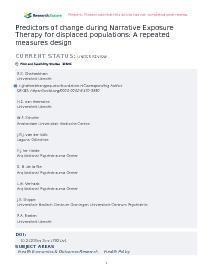Predictors of change during Narrative Exposure Therapy for displaced populations : A repeated measures design
Background: Displaced victims of interpersonal violence, such as refugees, asylum seekers, and victims of sexual exploitation, are growing in numbers, and are often suffering from a posttraumatic stress disorder (PTSD). At the same time these victims are known to benefit less from trauma-focused therapy, and to be less compliant to treatment. This paper describes the rationale and research protocol of an ongoing trial. In that trial , perceived daily stress, emotion regulation, and mood are investigated as predictors of change in PTSD symptoms during a trauma-focused therapy (Narrative Exposure Therapy (NET)), since these factors might impact the feasibility of therapy effectiveness.
Methods/design: Using an observational treatment design, 80 displaced victims of interpersonal violence will be measured before, during, and after partaking in NET. Several questionnaires tapping PTSD plus the aforementioned possible predictors of PTSD change will be administered: PostTraumatic Stress Disorder Checklist-5, Perceived Stress Scale, Difficulties in Emotion Regulation Scale-18 (pre-test, post-test, and follow-up),subscale impulsivity of the Difficulties in Emotion Regulation Scale-18, Perceived Stress Scale short version, Primary Care Posttraumatic Stress Disorder and a single Mood item (each session). Multilevel modelling will be used to examine the relation between the possible predictors and treatment outcome.
Discussion: The present study is the first to examine the interplay of facilitating and interfering factors possibly impacting treatment feasibility in displaced victims of interpersonal violence with PTSD receiving NET, using repeated measures. The current study can help to improve future treatment based on individual characteristics.
Geachte bezoeker,
De informatie die u nu opvraagt, kan door psychotraumanet niet aan u worden getoond. Dit kan verschillende redenen hebben,
waarvan (bescherming van het) auteursrecht de meeste voorkomende is. Wanneer het mogelijk is om u door te verwijzen naar de bron
van deze informatie, dan ziet u hier onder een link naar die plek.
Als er geen link staat, kunt u contact opnemen met de bibliotheek,
die u verder op weg kan helpen.
Met vriendelijke groet,
Het psychotraumanet-team.
In: BMC Pilot and Feasibility Studies, ISSN: 2055-5784
https://doi.org/10.21203/rs.3.rs-17921/v1
online: 19/03/2020


